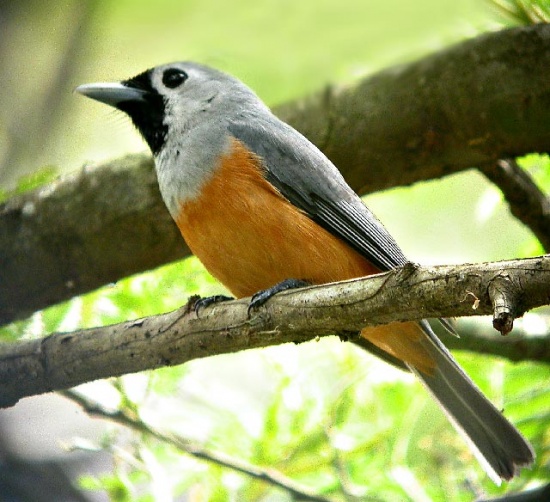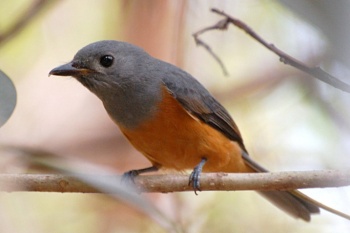(Picture of juvenile uploaded. Attempt to clean up some copied text, referenced) |
(Photo captions. References) |
||
| Line 1: | Line 1: | ||
| − | [[Image:Black-faced_Monarch.jpg|thumb|550px|right|Photo by {{user|Neil|Neil}}<br /> | + | [[Image:Black-faced_Monarch.jpg|thumb|550px|right|Photo by {{user|Neil|Neil}}<br /> Sydney, [[Australia]], November 2004]] |
;[[:Category:Monarcha|Monarcha]] melanopsis | ;[[:Category:Monarcha|Monarcha]] melanopsis | ||
==Identification== | ==Identification== | ||
| Line 11: | Line 11: | ||
[[Black-winged Monarch]] and [[Spectacled Monarch]] | [[Black-winged Monarch]] and [[Spectacled Monarch]] | ||
==Distribution== | ==Distribution== | ||
| − | [[Image:Black faced monarch immature.jpg|thumb|350px|right|Photo by {{user|daKing|daKing }}<br /> | + | [[Image:Black faced monarch immature.jpg|thumb|350px|right|Juvenile<br />Photo by {{user|daKing|daKing }}<br />Gold Coast [[Queensland]], [[Australia]], March 2008]] |
Eastern [[Australia]] (more common in north), migrating to [[New Guinea]]. | Eastern [[Australia]] (more common in north), migrating to [[New Guinea]]. | ||
==Taxonomy== | ==Taxonomy== | ||
| − | This is a monotypic species. | + | This is a [[Dictionary_M-S#M|monotypic]] species<sup>[[#References|[1]]]</sup>. |
==Habitat== | ==Habitat== | ||
| − | Rainforests, eucalypt woodlands, | + | Rainforests, eucalypt woodlands, scrub and damp gullies, in coastal areas |
==Behaviour== | ==Behaviour== | ||
====Diet==== | ====Diet==== | ||
| Line 23: | Line 23: | ||
The female builds a deep cup nest using casuarina needles, bark, roots, moss and spider web, about 3-6 m above the ground in the fork of a tree. Both sexes incubate the eggs and feed the young. | The female builds a deep cup nest using casuarina needles, bark, roots, moss and spider web, about 3-6 m above the ground in the fork of a tree. Both sexes incubate the eggs and feed the young. | ||
==References== | ==References== | ||
| − | #Birds in Backyards | + | #{{Ref-Clements6thDec09}}#Birds in Backyards |
| + | {{ref}} | ||
==External Links== | ==External Links== | ||
{{GSearch|Monarcha+melanopsis}} | {{GSearch|Monarcha+melanopsis}} | ||
*[http://www.aviceda.org/abid/birdimages.php?action=birdspecies&fid=69&bid=1292 View more images of this species on the ABID] | *[http://www.aviceda.org/abid/birdimages.php?action=birdspecies&fid=69&bid=1292 View more images of this species on the ABID] | ||
[[Category:Birds]][[Category:Monarcha]] | [[Category:Birds]][[Category:Monarcha]] | ||
Revision as of 17:31, 12 March 2010
- Monarcha melanopsis
Identification
- Black face not extending to the eyes
- Grey upperparts, wings and upper breast
- Rufous belly
- Dark eye with thin black eye ring, lighter area of pale grey around it
- Bill is blue-grey with a hooked tip
Young birds are similar without the black face. Black bill and rather a brownish body and wings
Similar Species
Black-winged Monarch and Spectacled Monarch
Distribution
Eastern Australia (more common in north), migrating to New Guinea.
Taxonomy
This is a monotypic species[1].
Habitat
Rainforests, eucalypt woodlands, scrub and damp gullies, in coastal areas
Behaviour
Diet
The diet includes insects.
Breeding
The female builds a deep cup nest using casuarina needles, bark, roots, moss and spider web, about 3-6 m above the ground in the fork of a tree. Both sexes incubate the eggs and feed the young.
References
- Clements, JF. 2009. The Clements Checklist of Birds of the World. 6th ed., with updates to December 2009. Ithaca: Cornell Univ. Press. ISBN 978-0801445019.
- Birds in Backyards
Recommended Citation
- BirdForum Opus contributors. (2024) Black-faced Monarch. In: BirdForum, the forum for wild birds and birding. Retrieved 8 May 2024 from https://www.birdforum.net/opus/Black-faced_Monarch





